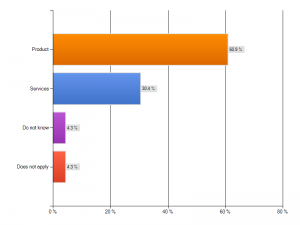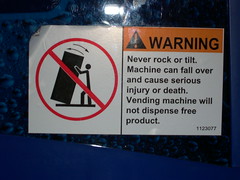What generates the highest profit margin, product or service? Pricing part 3
What generates the highest profit margin, product or service? Pricing part 3.
This was a surprising data point from our Oct 2010 survey on pricing. I was expecting that the impact of product commoditization, SaaS, web apps, tied freemium offers and the ample opportunity to up sell present clients would have made an impact on the survey from other times. Most analysts say that products are being commoditized and true value is coming from services. But it seems not.
Mature companies like SAP and Oracle are able to create huge profits from their services group. IBM has swung the majority of its revenue with huge profits from services. Best Buys Geek Squad has bigger profits than the stores (its a growth department and they generate 60 % of income on products that come from competitors) .
At Rocket Builders we see in this data a reflection of a less mature approach to the market and ultimately pricing errors due to poor value communication in the surveyed companies. Yes, the technology community is a youthful one , but the companies have been around for a good length of time through many cycles, with ample opportunities to build more mature business models.
A company might have very valid reasons for not getting more margin from a services group. Perhaps:
- The customers say they will not pay for services
- The competition does not charge for service
- Its part of a short term penetration strategy
- The services may not be valuable
- There are no salable services
Perhaps you have lower services margin for preventable reasons such as:
- You do not up sell services
- You do not track margin erosion through the services group
- You “toss” services in with the product sale
- You never thought about it
- You do not know how to do that
- Its part of your history and culture
- You do not grow your services departments soft skills and technical expertise
- Your customer experience is just not that great
- Field services does not sell
Service revenue should be a large and growing profit center for a well run company. It requires current customer knowledge and the extraction of the value you help a customer get out of your solution. But these are areas where knowledgeable and experienced marketing and sales departments can really bring the value stories back to the services department. Customer testimonials are the gold that will fill your mint.
Not getting the profits you deserve is preventable. If you want to know more about how to get more value for your services, give Rocket Builders a ring. Bringing out customer value is what we do every day.
Related articles
- 6 characteristics of successful Freemiums (techvibes.com)
- The Competitive Edge: Differentiating Your Product or Service (pamil-visions.net)
- What IS Your Position On Customer Service? (customerthink.com)
- 3 Tips for Cross-Selling and Upselling Success (customerthink.com)
- UPDATE 1-Gentex says profits jump but margins squeezed (reuters.com)
- Will Herbalife Earn or Burn? (fool.com)
- 5 Traits of Great Stocks (fool.com)
Category: Finance, Marketing, Pricing, Sales, Technology Industry
Freemium is not a strategy. Pricing part 10.
Freemium is not a pricing strategy. Pricing part 10. Freemium is at best a tactic in a strategic plan. In the depths of my cold salesy (black) heart I abhor giving anything away for free. Real customers pay.
- Free users are not hot prospects
- Free users are not customers. (Repeat twice and rinse)
- Free sets your reference price to zero . You can not lower it, and heaven help you when you try to raise it.
- A start-up whose only product is free is seen as less. Less sustainable, less stable. Remember Xmarks? I know they are coming back, but with a premium product.
There are a host of ways to monetize your freemium “tactic’ . At last count I have a list of over 25 separate things you can do. This is one of the areas where RocketBuilders helps companies get revenue (increase value) where they only see a struggle. Here are a few ideas:
- Colligo has a free product download , read only – you pay to be able to write to it
- Freshbooks gives you a small free trial account, With any kind of growth you need to upgrade to paying for more users/more accounts. This also increases your lock in.
- Dropbox gives you a free cloud storage account. Its so useful that you quickly fill it, needing to pay to upgrade capacity.
- Flickr allows three free albums. Once you get lots of pics in there, keeping them organized requires an upgrade.
In the always pay model, remember Quicktax. You buy the Standard edition, work your way through the forms and aha you get a prompt, ” You need the upgraded small business/investor/professional version to get more help on saving more money on your taxes. Click here to enter your credit card number.” Voila the upgraded version is unlocked. Brilliant.
Related articles
- MailChimp Do-It-Yourself Email Provider Reaches 500,000 Users (prweb.com)
- Going Freemium: One Year Later (mailchimp.com)
- Slideshare Is Going Freemium (mashable.com)
- Editor-in-Chief of Wired Magazine Promotes Freemium Business Model on Wix Website (pr.com)
- Free-for-All Web Marketing – Part 1 (jeffkorhan.com)
- Freemium business models for enterprise software? (dondodge.typepad.com)
- 6 characteristics of successful Freemiums (techvibes.com)
- Web Faceoff: Freemium vs. Ad Supported (mashable.com)
- The 3 Keys to Success with Freemium (startup-marketing.com)
- On Freemium (Again) (diversity.net.nz)
- More Social, Freemium Chatter Coming from Salesforce.com (thenextweb.com)

Category: Management, Marketing, Pricing, Sales
Sales’ response to a price rise. Pricing part 9.

- Image via Wikipedia
Sales’ response to a price rise. Pricing part 9. In many of the companies I have worked for, the last group to ask for a price rise would be sales. Perhaps you have tried to institute a price rise or even harder, change the comp plan to reflect a net margin component. (Its more work to manage revenue & net selling price than revenue.) What are the typical sales responses? Sound familiar?
- The sales force will not execute on anything that reduces their commission or jeopardizes their job.
- A variable commission on gasp “margin” can be seen as a penalty
- Maximizing volume is hard wired in many companies , so the team will always go for the Porsche, not the steak knives.
- Price protection requests will rise
- Long term contract obligations are brought up
- In the absence of tools, tactics and training on value selling, cowboy behavior will increase.
Aside from what the company culture rewards, there is a basic reason for these responses. Customers lie, especially to sales people. You lost the bid? Someone else “had a better price”. You won the bid? You priced it “just right”. Do not believe this. You lose more by being outsold, not out priced. You win, very often because you left so much money on the table (ie underpriced), but sales will rarely find out.
We see the lack of a truthful win loss reviews to be holding back so many companies, companies that then take what sales tells them at face value. By hiring a sales team, younger companies often hope they have solved their sales problem. Again hope is not a strategy.
Related articles
- When does the customer first ask about price? Pricing part 2. (regnordman.com)
- Rising potash prices could foil BHP bid (theglobeandmail.com)
- Pricing survey indicates you are dropping prices, but for the right reasons? Part 1. (regnordman.com)
- Sales Compensation Resources. (regnordman.com)
- Practical Pricing. Translating pricing theory into sustainable profit improvement. Michael Calogridis. (regnordman.com)
- Give Your Teams Swiss Army Knives (bothsidesofthetable.com)
- Your Company culture often works to resist raising prices. Pricing part 4 (regnordman.com)
- Are you still using Groupthink to set prices? Pricing panel 8 (regnordman.com)
- Is price raised at the beginning of your sales process? Pricing panel Part 6. (regnordman.com)

Category: Lead generation, Management, Marketing, Pricing, Sales





